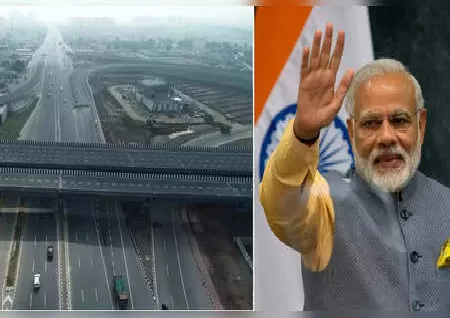Delhi to Jaipur in 3. 5 hrs after opening of Delhi-Mumbai Expressway stretch tomorrow

Prime Minister Narendra Modi will dedicate the Delhi-Dausa-Lalsot segment of the Delhi-Mumbai Expressway to the nation on Sunday. The Delhi-Mumbai Expressway's Rajasthan section will open, cutting the trip from Delhi to Jaipur from five hours to around three. This would significantly speed up the region's economic growth. The highway will link Delhi and Mumbai and reduce the distance travelled by almost 12 hours. Over Rs 12,150 crore was spent on the 246-km Delhi- Dausa - Lalsot segment of the Delhi—Mumbai Expressway. Before the general elections in 2024, the Bharatiya Janata Party (BJP) is thought to be making a significant infrastructure push with the opening of the Delhi-Mumbai Expressway's Rajasthan section. It would be the longest highway in India and contain eight lanes. The Delhi-Mumbai Expressway would connect significant cities including Kota, Indore, Jaipur, Bhopal, Vadodara, and Surat while traversing six states: Delhi, Haryana, Rajasthan, Madhya Pradesh, Gujarat, and Maharashtra. Along with spurs to brand-new, forthcoming greenfield airports like Jewar Airport, Navi Mumbai Airport, and JNPT Port, the Expressway will also provide access to 93 PM Gati Shakti Economic Nodes, 13 Ports, 8 Major Airports, and 8 Multi-Modal Logistics Parks (MMLPs).The Expressway will have a catalytic effect on the growth trajectory of all surrounding areas, significantly aiding the nation's economic transition.This highway is the first in Asia and India to provide underpasses and overpasses for animals. The alignment has been made to lessen the effect on the Ranthambore Wildlife Sanctuary. According to Union Minister Nitin Gadkari, the building of the Delhi-Mumbai Expressway would need over 4,000 skilled civil engineers and require the use of 25,000 million tonnes of bitumen. Along with this, he added, two further world records for the most PQC poured in a day and the most dense bitumen laid in a hundred hours have been established.
Related queries to this article
- Delhi
- Jaipur
- Delhi-Mumbai Expressway
- Bharatiya Janata Party
- Delhi Dausa
- Lalsot
- JNPT Port
- Jewar Airport
- Navi Mumbai Airport
- Multi-Modal Logistics Parks
- Union Minister Nitin Gadkari
- Narendra Modi
- Prime Minister
- Narendra Modi
Read more articles and stories on InstaSity Latest News.





